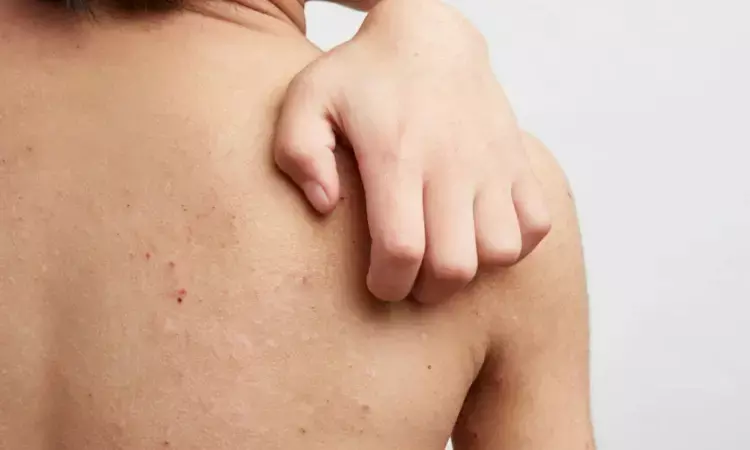- Home
- Medical news & Guidelines
- Anesthesiology
- Cardiology and CTVS
- Critical Care
- Dentistry
- Dermatology
- Diabetes and Endocrinology
- ENT
- Gastroenterology
- Medicine
- Nephrology
- Neurology
- Obstretics-Gynaecology
- Oncology
- Ophthalmology
- Orthopaedics
- Pediatrics-Neonatology
- Psychiatry
- Pulmonology
- Radiology
- Surgery
- Urology
- Laboratory Medicine
- Diet
- Nursing
- Paramedical
- Physiotherapy
- Health news
- Fact Check
- Bone Health Fact Check
- Brain Health Fact Check
- Cancer Related Fact Check
- Child Care Fact Check
- Dental and oral health fact check
- Diabetes and metabolic health fact check
- Diet and Nutrition Fact Check
- Eye and ENT Care Fact Check
- Fitness fact check
- Gut health fact check
- Heart health fact check
- Kidney health fact check
- Medical education fact check
- Men's health fact check
- Respiratory fact check
- Skin and hair care fact check
- Vaccine and Immunization fact check
- Women's health fact check
- AYUSH
- State News
- Andaman and Nicobar Islands
- Andhra Pradesh
- Arunachal Pradesh
- Assam
- Bihar
- Chandigarh
- Chattisgarh
- Dadra and Nagar Haveli
- Daman and Diu
- Delhi
- Goa
- Gujarat
- Haryana
- Himachal Pradesh
- Jammu & Kashmir
- Jharkhand
- Karnataka
- Kerala
- Ladakh
- Lakshadweep
- Madhya Pradesh
- Maharashtra
- Manipur
- Meghalaya
- Mizoram
- Nagaland
- Odisha
- Puducherry
- Punjab
- Rajasthan
- Sikkim
- Tamil Nadu
- Telangana
- Tripura
- Uttar Pradesh
- Uttrakhand
- West Bengal
- Medical Education
- Industry
Weekly Vitamin D Supplementation Boosts Levels in Children with Atopic Dermatitis but Fails to Alleviate Severity: Study

Chile: A recent randomized controlled trial revealed that in children with atopic dermatitis (AD), weekly vitamin D supplementation effectively increased vitamin D levels but did not significantly change the severity of the condition or type 2 immunity biomarkers compared to the placebo group.
The findings were published online in the Journal of the European Academy of Dermatology and Venereology on 14 March 2024.
Vitamin D (VD) deficiency is prevalent among patients with atopic dermatitis (AD) and is frequently linked to the severity of the condition. However, randomized trials assessing the impact of VD supplementation on AD have yielded mixed results, and there is limited data on how VD supplementation affects type 2 immunity in individuals with AD. To fill this knowledge gap, Arturo Borzutzky, Universidad Católica de Chile, Santiago, Chile, and colleagues aimed to examine the effectiveness of vitamin D supplementation in reducing the severity of atopic dermatitis and influencing type 2 immunity biomarkers.
For this purpose, the researchers conducted a randomized, double-blind, placebo-controlled trial. They randomly assigned 101 children with atopic dermatitis to receive either weekly oral vitamin D3 (VD3) or a placebo for six weeks. The primary outcome measured was the change in the Severity Scoring of Atopic Dermatitis (SCORAD).
The study led to the following findings:
- The mean age of participants was 6.3 ± 4.0 years, with a baseline SCORAD score of 32 ± 29. At the study's outset, 57% of the children were vitamin D deficient, with no significant differences between the groups.
- The increase in 25(OH)D levels was significantly greater in the vitamin D3 group compared to the placebo group (+43.4 ± 34.5 nmol/L versus +2.3 ± 21.2 nmol/L).
- There was no significant difference in SCORAD change at the six-week mark between the two groups (−5.3 ± 11.6 for vitamin D versus −5.5 ± 9.9 for placebo).
- There were no notable differences between the groups regarding changes in eosinophil counts, total IgE levels, specific IgE for Staphylococcal enterotoxin, or the cytokines CCL17, CCL22, CCL27, and LL-37.
- Staphylococcus aureus colonization in lesional skin showed no significant variation.
- Single nucleotide polymorphisms in the vitamin D receptor (VDR) gene, specifically FokI, ApaI, and TaqI, did not influence the subjects' response to vitamin D supplementation.
"The findings showed that while weekly vitamin D supplementation successfully improved vitamin D levels among children with atopic dermatitis, it did not lead to significant improvements in disease severity or type 2 immunity biomarkers, pointing to the need for multifaceted treatment strategies," the researchers concluded.
Reference:
Borzutzky, A., Iturriaga, C., Pérez-Mateluna, G., Cristi, F., Cifuentes, L., Silva-Valenzuela, S., Vera-Kellet, C., Cabalín, C., Hoyos-Bachiloglu, R., Navarrete-Dechent, C., Cossio, M. L., Roy, C. L., & Camargo, C. A. (2024). Effect of weekly vitamin D supplementation on the severity of atopic dermatitis and type 2 immunity biomarkers in children: A randomized controlled trial. Journal of the European Academy of Dermatology and Venereology, 38(9), 1760-1768. https://doi.org/10.1111/jdv.19959
Dr Kamal Kant Kohli-MBBS, DTCD- a chest specialist with more than 30 years of practice and a flair for writing clinical articles, Dr Kamal Kant Kohli joined Medical Dialogues as a Chief Editor of Medical News. Besides writing articles, as an editor, he proofreads and verifies all the medical content published on Medical Dialogues including those coming from journals, studies,medical conferences,guidelines etc. Email: drkohli@medicaldialogues.in. Contact no. 011-43720751


